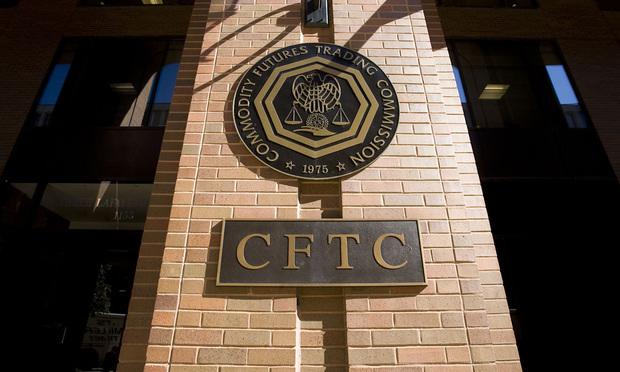US Judge Weighs Punishing CFTC Over Statements About Settlement
Kraft Food Groups and Mondelēz Global complained about what the U.S. Commodity Futures Trading Commission said regarding a $16 million settlement announced this week. Now, a Chicago judge wants to hear from the agency.
August 16, 2019 at 10:15 AM
5 minute read
 Photo: Diego M. Radzinschi/NLJ
Photo: Diego M. Radzinschi/NLJ
A Chicago federal judge on Monday will question the U.S. Commodity Futures Trading Commission over claims that its public statements announcing a $16 million settlement with two major food manufacturers went beyond the limited scope of what enforcers were allowed to say.
The two companies, Kraft Food Groups Inc. and Mondelēz Global LLC, said statements from the commodities agency Thursday “blatantly violate” the terms of a settlement resolving allegations of price manipulation in the wheat market. The consent order, ending four years of litigation, contained a provision that barred both sides from making “any public statement about this case other than to refer to the terms of this settlement agreement or public documents filed in this case.”
 Heath Tarbert. Credit: Diego M. Radzinschi/ NLJ
Heath Tarbert. Credit: Diego M. Radzinschi/ NLJCFTC chairman Heath Tarbert, announcing the settlement in a news release, said market manipulation “inflicts real pain on farmers by denying them the fair value of their hard work and crops.” He added: “It also hurts American families by raising the costs of putting food on the table. Instances of market manipulation are precisely the kinds of cases the CFTC was founded to pursue.”
U.S. District Judge John Blakey of the Northern District of Illinois, responding to the companies’ complaints about the CFTC’s comments, set an “emergency” hearing for Monday. The CFTC “should come prepared to answer allegations it has violated court orders and should be held in contempt and or subject to sanctions,” the court said in an order late Thursday.
Representatives from the companies did not say publicly what specific grievances they had with the CFTC’s statements about the settlement, and they did not offer how they think the dispute should be resolved. A spokesperson for the CFTC said in media reports that the “commission’s statement is fully compliant with the terms of the consent order.”
A spokesman for Mondelēz said in an email: “We can’t comment on the settlement per se but we strongly disagree with the CFTC’s statements, which blatantly violate and misrepresent the terms and spirit of the consent order, and will be seeking immediate relief from the court.” A statement from a Kraft representative mirrored that language.
Teams of lawyers from Jenner & Block and Eversheds Sutherland represented Kraft Foods and Mondelēz Global. Chicago-based Jenner partners J. Kevin McCall and Dean Panos did not return messages seeking comment.
The inclusion of a gag provision in the consent order drew two additional government statements that accompanied the main press release: one from the CFTC and one from the agency’s two Democratic commissioners.
The agency said in its statement that commissioners “do not expect the commission to agree to similar language in the future, except in limited situations where our statutory enforcement mission of preventing market manipulation is substantially advanced by the settlement terms and the public’s right to know about commission actions is not impaired.”
Two agency commissioners—Dan Berkovitz and Rostin Behnam—called the speech restriction, and another provision, “unusual.”
“Commissioners, as public officials, must be able to explain to Congress and the public the basis for the sanctions obtained, as well as the rationale for entering into a settlement agreement rather than pursuing litigation,” Berkovitz and Behnam said in their statement. “Although we disagree with any provision restricting the five-member commission’s capacity to make public statements, this provision does not impede our ability to provide information about this case to the public in light of each commissioner’s right to discuss this case freely.”
They added: “In our view, in future situations, the commission should not accept any confidentiality provisions or restrictions on the commission’s ability to make public statements.”
Berkovitz is a former Wilmer Cutler Pickering Hale and Dorr partner in Washington, and Behnam served as an aide to U.S. Sen. Debbie Stabenow, D-Michigan. Berkovitz, nominated by President Donald Trump last year, formerly served at the CFTC’s general counsel from 2009 to 2013. Behnam was nominated by Trump in 2017 and earlier was an investigator for the New Jersey Bureau of Securities. Tarbert, the CFTC chairman, is a former Allen & Overy partner.
Berkovitz and Behnam also raised questions about the absence of factual findings and conclusions of law in the consent order.
“Other federal agencies expressly prohibit consent or settlement agreements that restrict the agency’s ability to speak about settlements or the underlying action,” the two commissioners wrote. They pointed to a U.S. Justice Department policy “that prohibits it from entering into settlement agreements or consent decrees that are subject to a confidentiality provision in any civil matter in which the department is representing the interests of the United States or its agencies.”
That DOJ regulation, Berkovitz and Behnam said, is based on the “strong interest” the public has in knowing about the conduct of federal agencies.
Blakey on Thursday issued a judgment against Kraft and Mondelēz. Still, he retains jurisdiction to enforce the terms of the consent order.
Read more:
Wilmer’s Dan Berkovitz, Up for CFTC Seat, Reveals Big Law Income, Client List
Allen & Overy Pay Gets Spotlight in Trump Pick for Treasury Post
This content has been archived. It is available through our partners, LexisNexis® and Bloomberg Law.
To view this content, please continue to their sites.
Not a Lexis Subscriber?
Subscribe Now
Not a Bloomberg Law Subscriber?
Subscribe Now
NOT FOR REPRINT
© 2025 ALM Global, LLC, All Rights Reserved. Request academic re-use from www.copyright.com. All other uses, submit a request to [email protected]. For more information visit Asset & Logo Licensing.
You Might Like
View All
11th Circuit Rejects Trump's Emergency Request as DOJ Prepares to Release Special Counsel's Final Report
3 minute read
4th Circuit Revives Racial Harassment Lawsuit Against North Carolina School District
3 minute read
Fenwick and Baker & Hostetler Add DC Partners, as Venable and Brownstein Hire Policy Advisers
2 minute read
DOJ, 10 State AGs File Amended Antitrust Complaint Against RealPage and Big Landlords
4 minute readTrending Stories
- 1Decision of the Day: NYPD Officer's Sexual Assault of Informant Occurred Outside Scope of Employment
- 2'Not the President's Personal Lawyer': Lawyers Share Concerns Over How AG Pick Bondi’s Loyalism to Trump May Impact DOJ
- 3US Judge OKs Partial Release of Ex-Special Counsel's Final Report in Election Case
- 4The Demise of Truth and Transparency in Federal Sentencing
- 5Former Phila. Solicitor Sozi Tulante Rejoins Dechert
Who Got The Work
Michael G. Bongiorno, Andrew Scott Dulberg and Elizabeth E. Driscoll from Wilmer Cutler Pickering Hale and Dorr have stepped in to represent Symbotic Inc., an A.I.-enabled technology platform that focuses on increasing supply chain efficiency, and other defendants in a pending shareholder derivative lawsuit. The case, filed Oct. 2 in Massachusetts District Court by the Brown Law Firm on behalf of Stephen Austen, accuses certain officers and directors of misleading investors in regard to Symbotic's potential for margin growth by failing to disclose that the company was not equipped to timely deploy its systems or manage expenses through project delays. The case, assigned to U.S. District Judge Nathaniel M. Gorton, is 1:24-cv-12522, Austen v. Cohen et al.
Who Got The Work
Edmund Polubinski and Marie Killmond of Davis Polk & Wardwell have entered appearances for data platform software development company MongoDB and other defendants in a pending shareholder derivative lawsuit. The action, filed Oct. 7 in New York Southern District Court by the Brown Law Firm, accuses the company's directors and/or officers of falsely expressing confidence in the company’s restructuring of its sales incentive plan and downplaying the severity of decreases in its upfront commitments. The case is 1:24-cv-07594, Roy v. Ittycheria et al.
Who Got The Work
Amy O. Bruchs and Kurt F. Ellison of Michael Best & Friedrich have entered appearances for Epic Systems Corp. in a pending employment discrimination lawsuit. The suit was filed Sept. 7 in Wisconsin Western District Court by Levine Eisberner LLC and Siri & Glimstad on behalf of a project manager who claims that he was wrongfully terminated after applying for a religious exemption to the defendant's COVID-19 vaccine mandate. The case, assigned to U.S. Magistrate Judge Anita Marie Boor, is 3:24-cv-00630, Secker, Nathan v. Epic Systems Corporation.
Who Got The Work
David X. Sullivan, Thomas J. Finn and Gregory A. Hall from McCarter & English have entered appearances for Sunrun Installation Services in a pending civil rights lawsuit. The complaint was filed Sept. 4 in Connecticut District Court by attorney Robert M. Berke on behalf of former employee George Edward Steins, who was arrested and charged with employing an unregistered home improvement salesperson. The complaint alleges that had Sunrun informed the Connecticut Department of Consumer Protection that the plaintiff's employment had ended in 2017 and that he no longer held Sunrun's home improvement contractor license, he would not have been hit with charges, which were dismissed in May 2024. The case, assigned to U.S. District Judge Jeffrey A. Meyer, is 3:24-cv-01423, Steins v. Sunrun, Inc. et al.
Who Got The Work
Greenberg Traurig shareholder Joshua L. Raskin has entered an appearance for boohoo.com UK Ltd. in a pending patent infringement lawsuit. The suit, filed Sept. 3 in Texas Eastern District Court by Rozier Hardt McDonough on behalf of Alto Dynamics, asserts five patents related to an online shopping platform. The case, assigned to U.S. District Judge Rodney Gilstrap, is 2:24-cv-00719, Alto Dynamics, LLC v. boohoo.com UK Limited.
Featured Firms
Law Offices of Gary Martin Hays & Associates, P.C.
(470) 294-1674
Law Offices of Mark E. Salomone
(857) 444-6468
Smith & Hassler
(713) 739-1250










